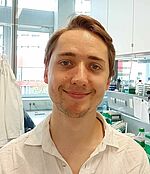HOME | NEWS | TEAM | RESEARCH | TEACHING | PUBLICATIONS | CYANO SEMINAR
Synthetic Triterpene Biosynthesis
The development of cyanobacteria as host organisms for biotechnological applications has attracted increasing interest in recent years. Several production systems for compounds with low structural complexity such as alcohols, sugars and fatty acids have been established in cyanobacteria model strains. In our working group we conduct research on cyanobacterial host systems to produce high value components like terpenoids. Terpenoids are a structurally diverse group of molecules with a wide range of biological functions. Many terpenoids have biological or pharmacological activity and are used in medicinal applications, in cosmetics and as food additives or fragrances. However, they are often only found in low levels in plants and can be difficult to extract and purify from the plant material.
Terpenoid precursors are synthesized from isopentenyl diphosphate (IPP) and dimethylallyl diphosphate (DMAPP). IPP and DMAPP are in turn synthesized via the methylerythritol-4-phosphate (MEP) pathway in most bacteria and chloroplasts or via the mevalonate (MVA) pathway and eukaryotes, archaea and some bacteria. The universal precursor for triterpenes and sesquiterpenes is farnesyl pyrophosphate (FPP) which is further catalyzed to squalene or carotenoids. For triterpenes, the natural production of squalene as an intermediate of the hopanoid pathway in the model cyanobacterium Synechocystis sp. PCC 6803 can be initially catalyzed by heterologous oxidosqualene cyclases (OSCs) to specific cyclization products, which can be further modified by P450 cytochromes and subsequently family 1-UDP glycosyltransferases. For the production of sesquiterpenes the precursor FPP can directly be catalyzed by heterologous terpene cyclase enzymes.
In our working group we were able to demonstrate the production of triterpenes such as lupeol, cycolartenol or marneral and are currently working on the pathway optimization to increase production of triterpene precursors such as squalene, as well as sesquiterpenes such as Valencene as proof-of-concept. In addition to classic metabolic engineering, we also work with mathematical models to improve the predictions of the pathway design.
Contact

Doktorand
Etage/Raum: 00.044

